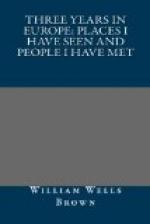At the head of Grassmere Lake, and surrounded by a few cottages, stands an old gray, antique-looking Parish Church, venerable with the lapse of centuries, and the walls partly covered with ivy, and in the rear of which is the parish burial-ground. After leaving the Dove’s Nest, and having a pleasant ride over the hills and between the mountains, and just as the sun was disappearing behind them, we arrived at the gate of Grassmere Church; and alighting and following Miss M., we soon found ourselves standing over a grave, marked by a single stone, and that, too, very plain, with a name deeply cut. This announced to us that we were standing over the grave of William Wordsworth. He chose his own grave, and often visited the spot before his death. He lies in the most sequestered spot in the whole grounds, and the simplicity and beauty of the place was enough to make one in love with it, to be laid so far from the bustle of the world, and in so sweet a place. The more one becomes acquainted with the literature of the old world, the more he must love her poets. Among the teachers of men, none are more worthy of study than the poets; and, as teachers, they should receive far more credit than is yielded to them. No one can look back upon the lives of Dante, Shakspere, Milton, Goethe, Cowper, and many others that we might name, without being reminded of the sacrifices which they made for mankind, and which were not appreciated until long after their deaths. We need look no farther than our own country to find men and women wielding the pen practically and powerfully for the right. It is acknowledged on all hands in this country, that England has the greatest dead poets, and America the greatest living ones. The poet and the true Christian have alike a hidden life. Worship is the vital element of each. Poetry has in it that kind of utility which good men find in their Bible, rather than such convenience as bad men often profess to draw from it. It ennobles the sentiments, enlarges the affections, kindles the imagination, and gives to us the enjoyment of a life in the past, and in the future, as well as in the present. Under its light and warmth, we wake from our torpidity and coldness, to a sense of our capabilities. This impulse once given, a great object is gained. Schiller has truly said, “Poetry can be to a man, what love is to a hero. It can neither counsel him nor smite him, nor perform any labour for him, but it can bring him up to be a hero, can summon him to deeds, and arm him with strength for all he ought to be.” I have often read with pleasure the sweet poetry of our own Whitfield of Buffalo, which has appeared from time to time in the columns of the North Star. I have always felt ashamed of the fact that he should be compelled to wield the razor instead of the pen for a living. Meaner poets than James M. Whitfield, are now living by their compositions; and were he a white man he would occupy a different position.




